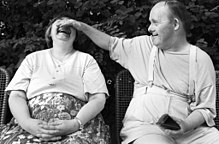Sexuality and partnership in people with disabilities
Sexuality and partnership in people with disabilities are sexual and / or partnership relationships and actions between people where at least one partner is affected by a mental , physical or psychological disability . A sexual preference for people with missing limbs is also known as amelotatism or amputation fetishism.
In the society of non-disabled people, these relationships are often stigmatized or ignored. For example, parenting and pregnancy between partners with severe disabilities and a non-disabled child are often criticized .
Difficulties in sexuality and partnership
Mental disabilities
In the case of intellectual disabilities such as a learning disability , comprehension, communication, language and action problems can arise during or even before sexual practices. Sexual stimuli and signals can be interpreted incorrectly or too childishly, for example. Another problem is that guardians try to make decisions about needs and drives, which can lead to misinterpretations. People with intellectual disabilities have to become aware of their adult roles and learn to deal with their bodies and emotions and what goes with them, such as taking responsibility . They need a lot of therapeutic support, at least at the beginning. Non-disabled people can also take advantage of the situation and create false expectations.
Physical disabilities
Physical disabilities can limit sexuality if there are functional disorders or restrictions or severe pain that some sexual practices do not make possible or only with the addition of aids or assistance. In some cases, medical and pharmaceutical interventions are required, for example to reduce pain and increase mobility. Non-disabled people can also take advantage of their physical helplessness and powerlessness to unintentionally sexually harass people.
Mental disabilities
With mental disabilities, sexual stimuli and signals can be misinterpreted and received. Individual key stimuli that, for example, evoke past memories and trauma , can also lead to psychological consequences such as fear or loss of reality . Sexual experiences can be viewed psychoanalytically or approached using behavioral therapy. People with mental illnesses can find it more difficult to find the right partner or to maintain happy relationships, as they suffer from attachment disorders or can be more inhibited by fears, doubts, delusions and grief etc. in relation to love and partnership. Non-disabled people can also take advantage of their psychological situation and, for example, promise security in the event of severe instability .
Legal basis
People with disabilities are on the Disability Convention , the Constitution and human rights in the partnership and sexuality equal basis with non-disabled people to be and are not discriminated against. They should have the possibility of sexual self-determination, a free choice of partner and the creation of a partnership and parenthood, provided that they do not endanger themselves or others. However, immaturity and dependence on guardians can lead to restrictions in development and accessibility cannot always be guaranteed.
Assistance options and therapeutic support
People with disabilities can use several assistance and counseling options as well as therapeutic support, e.g. B. by sex therapists , sex educators , special educators , occupational therapists or couple therapists and organize themselves in self-help groups. One possibility here is, for example, taking part in a body contact service. However, since topics such as sexuality are often taboo, those affected often do not dare to talk about their problems and complaints and seek help, and therapists often do not want to interfere with the patient's intimacy .
Consequences
consequences
People who do not pursue a partnership or sexuality due to disabilities can suffer from loneliness , self-doubt , depression and other psychological ailments and experience social isolation and not even take advantage of opportunities, which leads to a vicious circle . Missing sexual experiences are therefore compensated for by sexual fantasies. Since a relationship can lead to many difficulties and misunderstandings, a non-disabled partner should first get used to many things, have a supportive effect and show a lot of understanding. Despite everything, both partners should be equal in a relationship and dependency should be avoided where possible. In bringing up children with a non-disabled child, it can also become more difficult to model certain situations and roles of a non-disabled person, and educational interventions can be restricted by the disability.
restrictions
A partnership or a sexual relationship is often made more difficult by the conditions in a home for the disabled and the dependence on guardians, carers and carers, etc., as these leave little room for maneuver. Further restrictions arise, for example, from financial problems or restrictions in mobility and resilience . Disabled people therefore often look for disabled people as well, as they establish little contact with other people in homes or the like and are sometimes better understood and thus there is little sexual inclusion .
Psychological and educational point of view
From a psychoanalytical point of view, another problem is experiences and developmental tasks in children and adolescents (e.g. physical experiences and dealing with sexuality), which, due to the disability, cannot be done correctly or at all in accordance with their age and thus have a negative impact on psychosexual and social development can. It is therefore important to offer alternative options to gain these experiences and to adapt sex education accordingly.
literature
- Barbara Ortland: Disability and Sexuality: Basics of Disability- Specific Sex Education , W. Kohlhammer Verlag, 2008
- Jürgen Mohr, Christoph Schubert: Partnership and sexuality with intellectual disabilities, Springer-Verlag, 2013
- Angela Moll, Ben Moll: Sexuality of the mentally handicapped: handicapped sexuality? ; on the importance of sexuality for being human, 2010
- Jens Clausen: Living sexuality without disabilities: The human right to sexual self-determination, Kohlhammer Verlag, 2012
